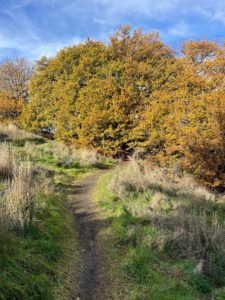Recently our Early Learning staff took part in a day of professional learning based on the mountain bike track at the Senior Campus. The day was designed to continue our learning and thinking about nature pedagogy. Kara Spence from Nature. Be In It, was our expert for the day. Kara is an environmental educator, with a background of working as a park ranger, both in Australia and Canada. She works with schools in Tasmania and Victoria to understand Nature Pedagogy, achieve curriculum alignment and develop policies and procedures that enable teachers to bring learning to life.
Our Early Learning staff team are passionate about the outdoors and our student’s complete units of inquiry including learning about nature and the environment. Through the Key Concepts that are embedded within our IB Primary Years Programme, our students learn about what the environment is, how it works, how it changes, what causes it to change, how it is connected to us, and the different perspectives about it and our responsibility for maintaining and improving it. We recognise that our learners find wonder in nature.
Many Bush kinder or nature play programmes focus more on learning and playing simply ‘in’ nature. What our staff have been learning about and planning for is a more comprehensive experience. Nature pedagogy is about forming a sense of belonging in nature and about learning in, from and with nature. Our staff see a benefit for our students both academically, through the acquisition of vital knowledge, and in promoting wellbeing. Academically, the outdoor learning environment provides opportunities for learning that are sometimes lesser or even absent indoors. Early number and early literacy concepts are abounding when you think about the opportunities for collections, time, length, sharing, negotiating and problem-solving that can occur in the outdoors. From a well-being perspective, there are real opportunities to build resilience, social skills, physical strength, balance and proprioception in our youngest learners, just to name a few.
Of course, there is a planned element of risk in a quality outdoor learning programme, which our staff are keenly aware of. Part of the work we have done so far in developing our own approach has been around understanding the risks in our environment and assessing the need to mitigate or promote them. We are seeking mental and physical challenges for our students that are appropriate for their developmental level, but we understand our responsibilities in keeping our students safe. We see a huge advantage for our student’s well-being in developing an approach that incorporates elements of ‘risky play’ and enables our students to develop physical and thinking skills and to learn and grow together.
We look forward to some further staff planning and then communicating to our Early Learning families about the commencement of our first Nature Based Learning Programme soon.




